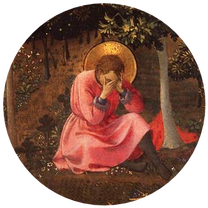Introduction
Widely held to be the first western Christian autobiography, Augustine’s Confessions (c. 397-400 A.D.) take the reader on a sometimes wild, often emotive and always mysteriously grace-infused journey, from his early life as a pear-thieving teenager to the conversion that lead to him ultimately becoming Bishop of Hippo and one of the greatest saints of the Christian Church. Covering universal themes such as sin, friendship, redemption and God’s inalienable love, the Confessions will, in the words of Professor Henry Chadwick, “always rank among the great masterpieces of western literature.”
Recommended Reading
Augustine, Confessions (Oxford World’s Classics), trans. by Henry Chadwick, Oxford University Press, 2008.
To download a short excerpt, please click on the link below:
Recommended Reading
Augustine, Confessions (Oxford World’s Classics), trans. by Henry Chadwick, Oxford University Press, 2008.
To download a short excerpt, please click on the link below:
| fypa8augustine.pdf | |
| File Size: | 53 kb |
| File Type: | |
VIDEO WILL GO HERE.
Questions for Reflection and Discussion
What is Augustine’s aim in writing the ‘Confessions’?
Why is God the only way for human beings to find rest? What are humans? What is the soul? Who is God to Augustine?
How do Augustine's theology and philosophy interact with Platonism? What more do Christianity and the Church give him?
Why is God the only way for human beings to find rest? What are humans? What is the soul? Who is God to Augustine?
How do Augustine's theology and philosophy interact with Platonism? What more do Christianity and the Church give him?
“Late have I loved you, beauty so old and so new: late have I loved you... You called and cried out loud and shattered my deafness. You were radiant and resplendent, you put to flight my blindness. You were fragrant, and I drew in my breath and now pant after you. I tasted you, and I feel but hunger and thirst for you. You touched me, and I am set on fire to attain the peace which is yours.”



